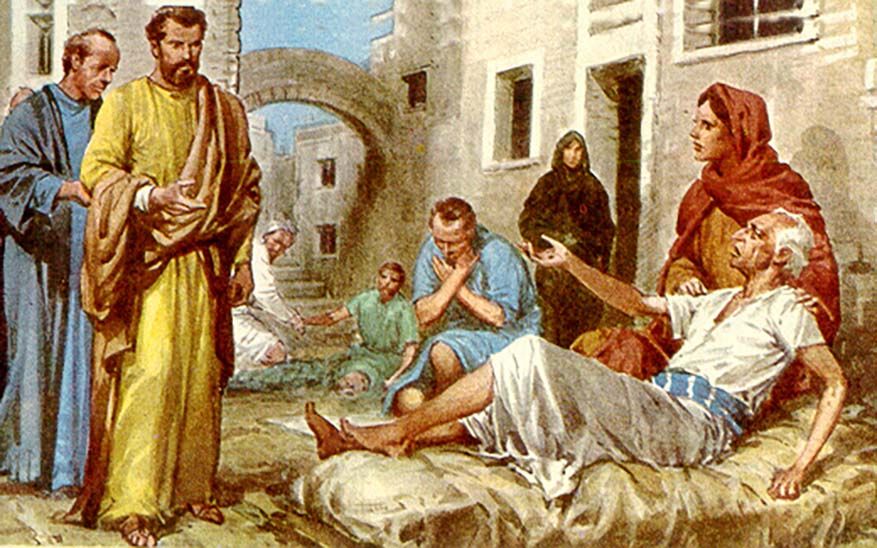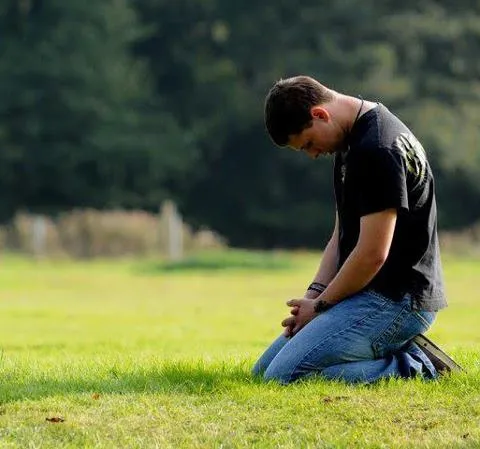The First Christian Communities: History
In order to understand ourselves in depth, it is necessary to know where we come from, what our roots are, and what changes our culture and religious beliefs have undergone over the years. Although God is the same today as he was 2 millennia ago, it does not mean that religious practices have remained unchanged over the years. For this reason, today we show you how the first Christian communities lived , what they were and much more.
First Christian Communities
The first Christian communities begin to form after the death of Jesus, who orders his apostles to spread the word in all corners of the world. In this way, his followers decide to heed their master’s mandate and set about their task of speaking with the people to proclaim the gospel and obtain more disciples.
The apostles decide to start with the Jewish people, so they head to Jerusalem and start spreading the word. In this way they begin to gain followers and over time the first community begins to form, although due to persecution and other related problems, many followers end up fleeing Jerusalem. But this did not mean the end, rather the opposite, since these new followers continued with their evangelization task and began to multiply the faithful in each place they went. So that is how the first Christian communities began to emerge. An example of this is not given by Philip in the capital of Samaria.
Another example is not given by the apostle Peter who would comment that Jesus approached him in a vision and indicated that he should transmit the gospel to the Gentiles. Which happened largely thanks to the conversion of Saul. Later this character would be named as an apostle next to Barnabas, but now he would be known as Paul.
A key point to spread the word and therefore favor the establishment of the first communities was the assembly of apostles that took place in Jerusalem, where urgent issues related to the position that should be assumed before the mission of the Gentiles were addressed. and on the meaning of the Mosaic law with respect to the gospel. From this meeting it is decided that the apostles Peter and James would continue the task of evangelizing the Jews.
Instead; the apostles Paul and Barnabas would go to the Gentile countries around the Mediterranean to continue spreading the word there. There were also some apostles, among whom was Eusebius and Caesarea, who decided to travel to the countries of Asia and Africa where it is known that they founded some communities.
This does not mean that all these communities have been able to establish and lead an ideal life, since they had to face many setbacks and hardships. In any case, in the “Acts of the Apostles” the life of these first communities can be grouped into three categories:
- From within the community: that is, the dynamics of these first communities and their communion.
- In the relationship they had with God: how prayer was given, how they carried out celebrations, rites, etc.
- Regarding how they carried out their mission: evangelization.
Community Dynamics
The word communion has an etymological meaning of common + union. Which translates into the union of all. This communion is obtained through faith in Jesus when there is a closeness between the people of the community so intimate that the relationship between one another becomes one of brotherhood (where you treat others as if they were your brothers).
This way of living together caused people within the community to really live as if they were brothers, sharing their resources with whoever needed it, helping each other and having real concern for the well-being of others. As for its social structure, it was not so complex, the apostles functioned as the motor of the community and gathered around them are the faithful.
The apostles had the mission of transmitting the teachings, life and news of Jesus. Being the word the main food of the community, which favored the increase of faith and union. It was typical and common, that everyone who was outside the community would make comments similar to “look at them, they all love each other”.
Your Celebrations
The cornerstone of whatever celebrations they had was prayer, which became a daily activity among early Christians. These moments of encounter took place in the temple. Although depending on the place and the situation it could be done at home. An example of this was Jerusalem where the churches did not yet exist.
In addition to their routine meetings, they held prayers at special moments. For example, when they had to make decisions that were important for the entire community or to ask the Lord to intercede and provide support to a brother or sister who was in danger. Although these last encounters used to be accompanied by some rite.
Regarding how their celebrations and rites were, it was common to perform the breaking of the bread. What can be said, it is an old version of what we know today as the Eucharist. These early Eucharists were mainly held in homes according to the order of Jesus. Another celebration that the first Christians began to practice was baptism. Rite that allowed the entrance or entrance to the community. The imposition of hands is also carried out for the transmission of the holy spirit or in case it was a particular commission from the community.
A particularity that these first celebrations in the church had, was that they served as a meeting point for the community (as it happens today), but at the same time; It allowed people to exchange goods and services, help those who need it and make donations among the members of the community.
This means that people took advantage of the fact that the entire community gathered to offer their products or services. They used that space to promote themselves and obtain some commercial benefit. But he also took away excess goods and resources to share with those who will need them. For example: if a family had wheat or bread left over, after the celebration of the word, they would distribute what was left over to those who would need it. In this way, the celebrations were a means to support each other and, in turn, to facilitate trade.
Evangelization
The early Christians understood the importance of the word, how this was good news and that it should be preached. For this reason, the task of evangelization was not only in the hands of the apostles (although they were the leading or main missionaries), all the members of the community put their grain of sand to promote the distribution of the word. They helped preach and announce the gospel.
In the first instance, their target population was the Jews, although over time they began to go to nearby towns and evangelize anyone they were close to.
Need for Organization
When the first communities began to form, the apostles had no problem talking to each of the faithful, organizing the moments and meeting points and holding the celebrations. All these responsibilities were the obligation of the apostles. But as the word spread and there were more and more faithful in the communities, the groups began to be very large and difficult in a way due to the limited number of apostles that there were at that time. For this reason, they began to appoint people to help them perform some services.
Those who wanted to have this responsibility had to do the rite of laying on of hands. These celebrations made by those entrusted by the apostles are beginning to be known as “ministeries”, which is a word from Latin whose meaning is: services. These services were mainly divided into two different types:
- The ministry of the word: consists of preaching the gospel and taking care that the information handled by the faithful is the gospel that was preached by Jesus.
- The ministry of presiding over the community and helping them with all their spiritual and material needs. This means that this person provided help not only in aspects related to the gospel, but also acted as a leader in the community helping people with their different problems.
The role played by the apostles in the organization of these first communities is key. Since in principle, they are the ones who have a better knowledge of the gospel. So that after ensuring that a community has representatives qualified enough to carry out the ministry of the word without their support, they can move to another city to create a new community.
Apart from these two ministries mentioned, others begin to emerge as needs, circumstances or the community require. For example, to collect money, make special envoys, ask for the help of members of the community who are at risk, sick or unjustly imprisoned, ask for the prophets, doctors, etc.
Due to the difficulty of communication between the communities due to the long distances that separated them, it happened that in each community different ministries were created that were different for each community. This is one of the main reasons why at the end of the first century, three ministries began to be incorporated in order to have a greater organization and structure among the communities: the bishop, the priests and the deacons.
First Conflicts
When the apostles begin to form Christian communities, all the members were initially practicing Jews. During the early years, the Jews continued to maintain their practices in parallel with Christian customs, such as circumcision or prayers in Jewish temples. When the gospel reaches some cities like Antioch in Syria, where Judaism represents a minority, those who convert to Christianity are not Jews, but pagans.
From here some questions and divisions begin to arise regarding how to proceed. For example, those who converted to Christianity had to stop performing the rites and traditions of their old religions or could continue to do so. Apostles such as James indicated that there was no problem with this, but others such as Paul and Barnabas who preached mainly in pagan territory, did not support this opinion, indicating that to be Christians completely one had to leave behind the old beliefs and rites.
One way to solve this problem was to request the help of the apostles, who are responsible for ensuring that the mandates established by the Lord Jesus are fulfilled. Peter is the one who takes responsibility for the matter on behalf of the rest of the apostles and as a representative of all the communities and mentions that the solution is to believe in faith in Jesus, since this is the only means by which salvation can be achieved. .
Thus, he rejects the idea of complying with laws that are contrary to what the word says, moreover; converted pagans have already received the holy spirit. Santiago is in favor of this resolution and a letter is issued that is then sent to Antioch to calm the controversy that was growing.
After the celebration of this assembly in Jerusalem, the church rescues three important aspects:
- Christians are not an offshoot or sect of Judaism.
- Rules and laws lose relevance if they do not follow faith in Jesus, who is the only savior. This point is important because it encourages people to devalue the laws of the state if they were contrary to the gospel.
- Salvation is achieved through faith in Jesus, but it must be promoted to all the peoples of the earth.
These are the only rules I believe. In addition to this alone, it was limited to eliminating norms that already existed and hindered evangelization.
Beginning of the Persecutions
The first religious conflicts began to occur with the Jews. The figure in charge at that time of the Jewish religion: the high priest, could not let the message spread that Jesus was the messiah, that he had risen and that the spirit promised by the prophets had already been sent. Since this endangered all his teachings and doctrines. So he started a persecution and campaign against the apostles, leaders of the Christian faith and Christianity in general. Seeking to defame and tarnish the name of religion.
Some apostles like Esteban, were victims of these accusations issued by the high priest in conjunction with some Jewish radicals. Despite this, not always and not all Christians were persecuted. It could be said that the peaks occurred at times, when the Jewish religious leaders felt threatened by the increase in the Christian faithful.
No matter how bad the harassment and persecution, the apostles never gave up and never stopped working and evangelizing. In fact, many of the dispersions that were carried out by the Jews achieved an adverse result than they expected, because curiously; it increased congregations, meetings and celebrations causing the teachings of Jesus to spread faster.
In turn, these dispersions and persecutions forced many Christians to emigrate to other cities and other countries, increasing the rate of growth of Christianity. Since each Christian became an evangelist and began to preach the word. As a result of the persecutions, the term “Martyr” was created, which means “witness”. Reason why those who gave their lives to bear witness to Jesus were called martyrs. Stephen was the first martyr known to the church.
After the death of the apostle Stephen, persecution of Christians increased, mainly in the Roman Empire. The Christian religion, by order of the law, was considered a Jewish sect that until the death of Nero in 68 AD was the rival of the Roman religion.
Later, in the early 4th century, was when Christianity really spread throughout the land to a point where the Roman Empire had only two options to accept it or try to end it. In this way, Diocletian makes the decision to eliminate Christianity, although he fails completely until Emperor Constantine I, known as “the great” is baptized and converts to Christianity. Thus forming the Christian empire.
Charity of the First Christian Communities
The theme of charity is very recurrent in Christian meetings. When a celebration is held that aims to delve into this area, the faithful usually turn to the texts of the summaries of the book of the Acts of the Apostles. Where we seek wisdom and knowledge through the stories that they left us about what the fraternal life of the first Christian communities was like. This means that we use these passages as a reference point to learn how to live practicing love today.
Unfortunately, it cannot be forgotten that the first Christian communities are very different from the communities that we can find today. Not only in the way in which the interpersonal encounter was carried out, but also the context in which they arose and the adversities and dangers they had to face. In addition, the social and ecclesiastical structure was different.
The first thing we must understand is that these texts were written to serve as a paradigm for believers, but due to the changes that we have suffered over time, we must be cautious when approaching their teachings or else, they could become a sign of frustration for today’s Christians, not being able to achieve that ideal dream of love as narrated by the apostles.
This does not mean that you should think that it is impossible to achieve that ideal, simply that just as has happened with humanity, we must adapt and understand that some aspects and approaches are different today. On the other hand, the texts of the New Testament are not the only examples we have of what the coexistence of charity was like, nor should we forget that there were other communities in addition to the one in Jerusalem that we can use as a model.
Another thing that happens is that Christians mistakenly believe that these first communities were the best simply because they were the first or the successors of the apostles and the death of Jesus. As if the temporal proximity guarantees its proper functioning or is the only way to have a valid model that follows the word of God. But this could not be more wrong than reality. As we have already seen, these first communities had to face many obstacles and challenges.
The reason for this section is to open the eyes of the reader so that he is able to see beyond the words and texts that we have and use as references. Being able to immerse yourself in the author’s pen and understand the historical context in which the events take place and how that influenced the gospel and the word of God. In other words, that you can empathize and understand the experiences, emotions, frustrations, feelings and sufferings suffered by the first Christian communities. Now, the common thing is that you ask yourself, what is this for?
Part of the answer, as you can see, is to understand these early communities. Because if you manage to do it, it will be much easier to transfer this knowledge to the present day and adapt the teachings of the Gospel of Jesus to the dynamics of life that is lived today so that this ideal of love can stop being a simple ideal and become make it an achievable goal.
Going back to the first Christian communities, it was very hard to maintain charity and love. Especially when they begin to be persecuted and punished by the Jews. Since it is very difficult to maintain love in others when it causes us so much damage. Which happened with many Christian families who were persecuted, expelled, tortured and mistreated. I believe that this should be an important example of tolerance, because few of us today have endured as much hardship as these first Christian communities had to.
If the information you have found here has been useful to you, we recommend you also visit:

Hello! Let me enthusiastically introduce myself as a dedicated blogger fueled by an intense passion for meticulously crafting insightful and well-researched blogs. My mission revolves around providing you, dear readers, with a veritable treasure trove of invaluable information.





